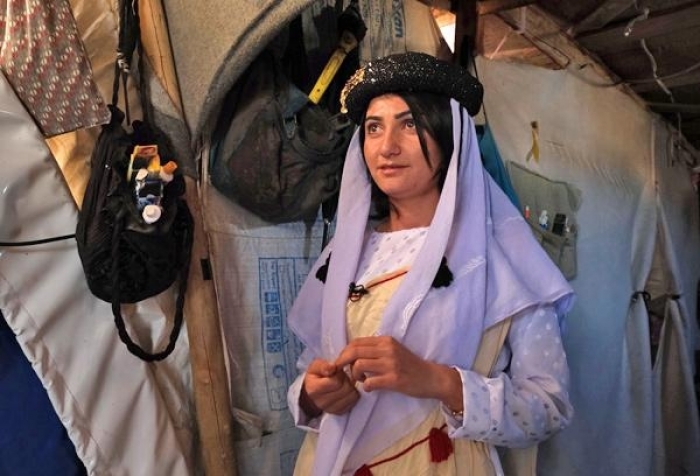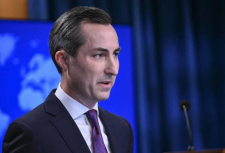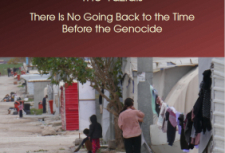Iraqi minorities concerned about possible US troop withdrawal

BAGHDAD — Members of various religious minorities in Iraq say they are worried that a possible US troop withdrawal could negatively affect the future diversity of the country. Ezidis and Christians said they are especially concerned. In the wake of the victory over the Islamic State (IS), Ezidi and Christian demands were a top priority for the Iraqi government and were often taken on by the international community and the UN Assistance Mission for Iraq. However, these demands no longer command the same level of public and official interest.Representatives of minorities were unhappy with the Jan. 5 parliamentary vote for the United States to withdraw dismissed the opinions of minorities, including Sunnis and Kurds, seeing it as a Shiite monopolization of national decision-making. These representatives say disputes between various powerful groups will likely mean that the minorities will see their territorial bases shrink, perhaps drastically; this may be particularly the case in Sinjar and the Ninevah Valley, where the central government and the Kurdistan Regional Government are fighting for influence. There also is the matter of Turkish and Iranian interventions in Iraq. Meanwhile, the US-Iranian conflict is raging, much of it along the Iraqi-Syrian border, even though Iranian Maj. Gen. Qasem Soleimani was killed by a US drone at the Baghdad airport and US bases away from the border have been targeted. Amid the hubbub surrounding a US withdrawal, there is lack of trust in the Iraqi government. Shiites constitute the largest political grouping in the country, and Shiite elites have stuck with the militias of the Popular Mobilization Units, which often have been in competition with other sectors of society.Iraqi minorities, because they have a weak demographic weight and limited powers of self-protection, have resorted to the international community — and notably to the United States — as an alternative to the absence or ineffectiveness of the state.Murad Ismail, executive director of the Yazda organization, said Ezidis “support Iraq’s independence and its firm sovereignty over its territories, but practically, we need international support in the post-IS phase.”Ismail said that in terms of economics, 95% of labor in the minority areas comes from international support, while the efforts of the Iraqi government are limited. Politically, the US government recognized the Ezidi genocide, and the Ezidi issue has become an international matter. This international recognition earned Ezidis a seat at the table with the Iraqi government; it is likely that the remarkable progress on the Ezidi issue would not have taken place if the matter had been solely left up to the Iraqi government.Ismail appeared alongside US President Donald Trump when Trump signed the Iraq and Syria Genocide Relief and Accountability Act, which offered support to religious minority victims in Iraq and Syria who suffered due to the IS genocide, acts against humanity and crimes of war.
Ezidi24.com
Tags: #yazidisinfo #ezidi #yazidi #newsezidi
Iraqi minorities concerned about possible US troop withdrawal

BAGHDAD — Members of various religious minorities in Iraq say they are worried that a possible US troop withdrawal could negatively affect the future diversity of the country. Ezidis and Christians said they are especially concerned. In the wake of the victory over the Islamic State (IS), Ezidi and Christian demands were a top priority for the Iraqi government and were often taken on by the international community and the UN Assistance Mission for Iraq. However, these demands no longer command the same level of public and official interest.Representatives of minorities were unhappy with the Jan. 5 parliamentary vote for the United States to withdraw dismissed the opinions of minorities, including Sunnis and Kurds, seeing it as a Shiite monopolization of national decision-making. These representatives say disputes between various powerful groups will likely mean that the minorities will see their territorial bases shrink, perhaps drastically; this may be particularly the case in Sinjar and the Ninevah Valley, where the central government and the Kurdistan Regional Government are fighting for influence. There also is the matter of Turkish and Iranian interventions in Iraq. Meanwhile, the US-Iranian conflict is raging, much of it along the Iraqi-Syrian border, even though Iranian Maj. Gen. Qasem Soleimani was killed by a US drone at the Baghdad airport and US bases away from the border have been targeted. Amid the hubbub surrounding a US withdrawal, there is lack of trust in the Iraqi government. Shiites constitute the largest political grouping in the country, and Shiite elites have stuck with the militias of the Popular Mobilization Units, which often have been in competition with other sectors of society.Iraqi minorities, because they have a weak demographic weight and limited powers of self-protection, have resorted to the international community — and notably to the United States — as an alternative to the absence or ineffectiveness of the state.Murad Ismail, executive director of the Yazda organization, said Ezidis “support Iraq’s independence and its firm sovereignty over its territories, but practically, we need international support in the post-IS phase.”Ismail said that in terms of economics, 95% of labor in the minority areas comes from international support, while the efforts of the Iraqi government are limited. Politically, the US government recognized the Ezidi genocide, and the Ezidi issue has become an international matter. This international recognition earned Ezidis a seat at the table with the Iraqi government; it is likely that the remarkable progress on the Ezidi issue would not have taken place if the matter had been solely left up to the Iraqi government.Ismail appeared alongside US President Donald Trump when Trump signed the Iraq and Syria Genocide Relief and Accountability Act, which offered support to religious minority victims in Iraq and Syria who suffered due to the IS genocide, acts against humanity and crimes of war.
Ezidi24.com
Tags: #yazidisinfo #ezidi #yazidi #newsezidi

























